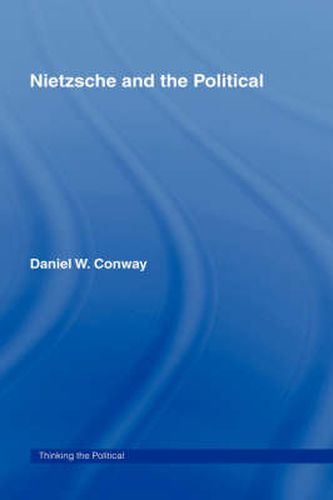Readings Newsletter
Become a Readings Member to make your shopping experience even easier.
Sign in or sign up for free!
You’re not far away from qualifying for FREE standard shipping within Australia
You’ve qualified for FREE standard shipping within Australia
The cart is loading…






Nietzsche’s contributions to politics, and to political philosophy, are notoriously difficult to define clearly. Throughtout the twentieth century critics have warned that nothing Nietzsche says in fact rules out the illiberal political regimes to which his name has been linked. He casts modernity in a negative light, often describing it in terms of approaching European nihilism and the spread of decadence. However, Nietzsche and the Political reminds us how his analysis of modernity also produces in Nietzsche a liberating effect. Content to leave the details of government and regulation of politics to others Nietzsche instead raises the profound political question: what ought humankind become? Daniel Conway shows how Nietzsche’s political thinking thus bears a closer resemblance to the conservative republicanism of his predecessors than to the progressive liberalism of his contemporaries. The key contemporary figures such as Habermas, Foucault, McIntyre, Rorty and Rawls is also examined in the light of Nietzsche’s political legacy. Nietzsche and the Political also draws out important implications for contemporary liberalism and feminist thought, above all showing Nietzsche’s continuing relevance to the shape of political thinking today. Of interest both to students of Nietzsche’s thought and contemporary political theory, Nietzsche and the Political will also appeal to more advanced readers in sociology and history.
$9.00 standard shipping within Australia
FREE standard shipping within Australia for orders over $100.00
Express & International shipping calculated at checkout
Stock availability can be subject to change without notice. We recommend calling the shop or contacting our online team to check availability of low stock items. Please see our Shopping Online page for more details.
Nietzsche’s contributions to politics, and to political philosophy, are notoriously difficult to define clearly. Throughtout the twentieth century critics have warned that nothing Nietzsche says in fact rules out the illiberal political regimes to which his name has been linked. He casts modernity in a negative light, often describing it in terms of approaching European nihilism and the spread of decadence. However, Nietzsche and the Political reminds us how his analysis of modernity also produces in Nietzsche a liberating effect. Content to leave the details of government and regulation of politics to others Nietzsche instead raises the profound political question: what ought humankind become? Daniel Conway shows how Nietzsche’s political thinking thus bears a closer resemblance to the conservative republicanism of his predecessors than to the progressive liberalism of his contemporaries. The key contemporary figures such as Habermas, Foucault, McIntyre, Rorty and Rawls is also examined in the light of Nietzsche’s political legacy. Nietzsche and the Political also draws out important implications for contemporary liberalism and feminist thought, above all showing Nietzsche’s continuing relevance to the shape of political thinking today. Of interest both to students of Nietzsche’s thought and contemporary political theory, Nietzsche and the Political will also appeal to more advanced readers in sociology and history.